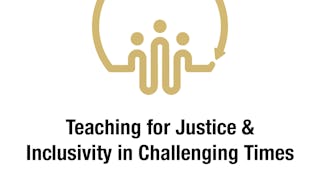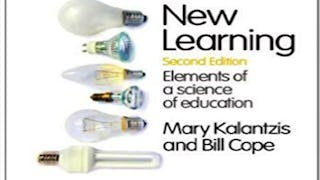Resilient teaching is the ability to facilitate learning experiences that are designed to be adaptable to fluctuating conditions and disruptions. This teaching ability can be seen as an outcome of a design approach that attends to the relationship between learning goals and activities, and the environments they are situated in. Resilient teaching approaches take into account how a dynamic learning context may require new forms of interactions between teachers, students, content, and tools. Additionally, they necessitate the capacity to rethink the design of learning experiences based on a nuanced understanding of context.

Enjoy unlimited growth with a year of Coursera Plus for $199 (regularly $399). Save now.

Resilient Teaching Through Times of Crisis and Change

Instructor: Rebecca Quintana, PhD
7,150 already enrolled
Included with
(62 reviews)
What you'll learn
Identify key interactions that we want to facilitate in our courses
Apply guiding principles of resilient design for learning to develop a course plan
Discuss ways technology and tools can be used to facilitate interactions in support of learning in fluctuating instructional environments
Draw inspiration from examples that highlight resilient teaching during the emergency remote teaching phase
Skills you'll gain
Details to know

Add to your LinkedIn profile
See how employees at top companies are mastering in-demand skills

There are 4 modules in this course
We take a brief look in our “rearview mirror” and reflect on the challenges of the emergency remote teaching phase that was prompted by the onset of the COVID-19 crisis. We then look to “the horizon line” and make a case for why we need a resilient approach to course design now more than ever. We do this by examining characteristics of a wide range of potential instructional scenarios that will impact how students and faculty teach and learn. We then examine the construct of “resilience” and situate it within a range of disciplines in order to be able to articulate key characteristics of resilient design.
What's included
9 videos16 readings1 assignment4 app items5 discussion prompts
We examine a systems design approach in order to be able to identify key components of a system. We then consider how system components relate to course design. Building on this, we use ideas from education, such as the interactions triangle and universal design for learning as we move towards articulating principles of resilient design for learning. We define and articulate three guiding principles for resilient design for learning: designing for extensibility, designing for flexibility, and designing for redundancy.
What's included
8 videos6 readings1 assignment7 app items3 discussion prompts
We hear from Professor Chris Quintana who describes the characteristics, challenges, and context of a course he will be teaching next semester. We follow a worked example of how Professor Quintana is using the instructional triangle and the three guiding principles of resilient design for learning to inform course design decisions. Participants reflect on their own course design contexts and use these reflections as the basis of a peer-graded resilient teaching plan.
What's included
6 videos6 readings1 peer review1 app item
We are introduced to a care-centered model of instruction as an alternative but complementary frame for considering how instructors can foreground learner-centered pedagogical approaches through times of crisis and change. We examine a range of brief case studies that highlight inspiring examples from instructors who reflect on their experiences during the remote teaching phase and consider how both care-centered approaches and principles of resilient design for learning are evidenced in these examples.
What's included
4 videos24 readings1 discussion prompt
Instructor

Offered by
Explore more from Education
 Status: Preview
Status: PreviewUniversity of Colorado Boulder
 Status: Free Trial
Status: Free TrialUniversity of Colorado System
 Status: Preview
Status: PreviewUniversity of Illinois Urbana-Champaign
 Status: Free Trial
Status: Free TrialHarvard Business Review
Why people choose Coursera for their career




Learner reviews
62 reviews
- 5 stars
85.48%
- 4 stars
11.29%
- 3 stars
1.61%
- 2 stars
1.61%
- 1 star
0%
Showing 3 of 62
Reviewed on Jul 22, 2021
The topic was very timely. Thank you for all the learnings!
Reviewed on Nov 8, 2020
Great course to help adapt with unpredictable time in education.
Reviewed on Aug 16, 2020
An excellent introduction to the principles and practices of resilient teaching.

Open new doors with Coursera Plus
Unlimited access to 10,000+ world-class courses, hands-on projects, and job-ready certificate programs - all included in your subscription
Advance your career with an online degree
Earn a degree from world-class universities - 100% online
Join over 3,400 global companies that choose Coursera for Business
Upskill your employees to excel in the digital economy
Frequently asked questions
To access the course materials, assignments and to earn a Certificate, you will need to purchase the Certificate experience when you enroll in a course. You can try a Free Trial instead, or apply for Financial Aid. The course may offer 'Full Course, No Certificate' instead. This option lets you see all course materials, submit required assessments, and get a final grade. This also means that you will not be able to purchase a Certificate experience.
When you purchase a Certificate you get access to all course materials, including graded assignments. Upon completing the course, your electronic Certificate will be added to your Accomplishments page - from there, you can print your Certificate or add it to your LinkedIn profile.
Yes. In select learning programs, you can apply for financial aid or a scholarship if you can’t afford the enrollment fee. If fin aid or scholarship is available for your learning program selection, you’ll find a link to apply on the description page.
More questions
Financial aid available,
¹ Some assignments in this course are AI-graded. For these assignments, your data will be used in accordance with Coursera's Privacy Notice.

